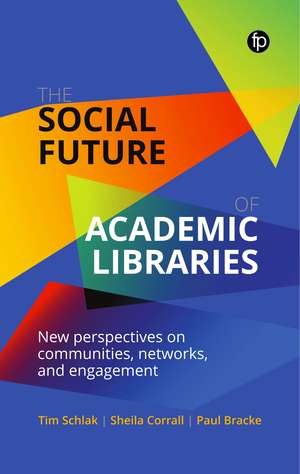The Social Future of Academic Libraries: New Perspectives on Communities, Networks, and Engagement
Autor Paul Bracke, Tim Schlak, Sheila Corrallen Limba Engleză Hardback – 22 dec 2022
The current focus in higher education institutions on student engagement, partnership formation, community development and social relations requires a significant mind-shift in academic libraries and librarians if they are to regain their place at the heart of the academic enterprise. Libraries need to move beyond incremental and peripheral development of services, spaces and structures to a more fundamental and radical rethinking of their core mission and service philosophy to realign their resources, processes and practices to contemporary demands. Academic librarians have seen the need for change in response to the social turn in the academy and society, and have been exploring concepts such as converged and shared services, partnership and relationship management, blended and engaged librarians, embedded and participatory librarianship, and inside-out and pop-up libraries. But such work has generally been limited to small parts of the organization, and has not usually resulted in the largescale change in strategy and culture needed for libraries to operate effectively as dynamic social organizations in the connected digital world. New ways of working are not enough; they must be informed by new ways of thinking that empower librarians to look at all areas of their practice in a unified holistic way through a social lens. Concepts and theories of intellectual and social capital can give practitioners new perspectives on their work and provide a framework for the hard reset needed for academic libraries to remain relevant in the 21st century.
This book introduces readers to these ideas and uses case studies from real-world experience to show how intellectual and social capital perspectives and social network theory can strengthen strategic development, collaborative relationships and professional leadership across all areas of library activity. Examples of application areas include academic liaison, collection development, data services, information literacy, library fundraising, service design, space utilization, and student success.
Preț: 685.14 lei
Preț vechi: 1083.76 lei
-37% Nou
131.33€ • 137.84$ • 108.32£
Carte nepublicată încă
Specificații
ISBN-10: 1783304723
Pagini: 200
Dimensiuni: 156 x 234 mm
Ediția:1
Editura: Facet Publishing
Colecția Facet Publishing
Public țintă
Professional Practice & DevelopmentCuprins
Notă biografică
Sheila Corrall is Professor of Library and Information Science in the Department of Information Culture and Data Stewardship at the University of Pittsburgh, PA, where she is lead faculty for academic information services. Prior to joining Pitt in 2012, she was Head of the iSchool at the University of Sheffield, following a distinguished career in the field as a library practitioner, serving as director of library, information, and academic services at three universities in the UK. She read Classics at the University of Cambridge, and studied Librarianship at the Polytechnic of North London, then gained her M.B.A. from Roffey Park Management College and M.Sc. in Information Systems at the University of Southampton. Sheila’s research interests include evolving roles in academic libraries, reflective practice in information work, and the application of business management concepts and models to information services.
Paul Bracke is Dean of Library Services at Gonzaga University. In this role, he provides leadership and oversight for Library Services, the Office of Sponsored Research and Programs, and the Academic Technology Applications Support unit. Previously, he was Associate Dean for Research and Assessment and Associate Professor of Library Science at the Purdue University Libraries where he developed internationally recognized research support services, including the development of research data support services and institutional and data repositories. He holds a PhD in Higher Education from the University of Arizona, an MS in Library and Information Science from the University of Illinois at Urbana-Champaign, and a BA in History and Journalism from the University of Missouri-Columbia. He has published and presented on the social relations of librarians and emerging roles for librarians, particularly in relation to research.
Descriere
The current focus in higher education institutions on student engagement, partnership formation, community development and social relations requires a significant mind-shift in academic libraries and librarians if they are to regain their place at the heart of the academic enterprise. Libraries need to move beyond incremental and peripheral development of services, spaces and structures to a more fundamental and radical rethinking of their core mission and service philosophy to realign their resources, processes and practices to contemporary demands. Academic librarians have seen the need for change in response to the social turn in the academy and society, and have been exploring concepts such as converged and shared services, partnership and relationship management, blended and engaged librarians, embedded and participatory librarianship, and inside-out and pop-up libraries. But such work has generally been limited to small parts of the organization, and has not usually resulted in the largescale change in strategy and culture needed for libraries to operate effectively as dynamic social organizations in the connected digital world. New ways of working are not enough; they must be informed by new ways of thinking that empower librarians to look at all areas of their practice in a unified holistic way through a social lens. Concepts and theories of intellectual and social capital can give practitioners new perspectives on their work and provide a framework for the hard reset needed for academic libraries to remain relevant in the 21st century.
This book introduces readers to these ideas and uses case studies from real-world experience to show how intellectual and social capital perspectives and social network theory can strengthen strategic development, collaborative relationships and professional leadership across all areas of library activity. Examples of application areas include academic liaison, collection development, data services, information literacy, library fundraising, service design, space utilization, and student success.
Recenzii
— Technical Services Quarterly









